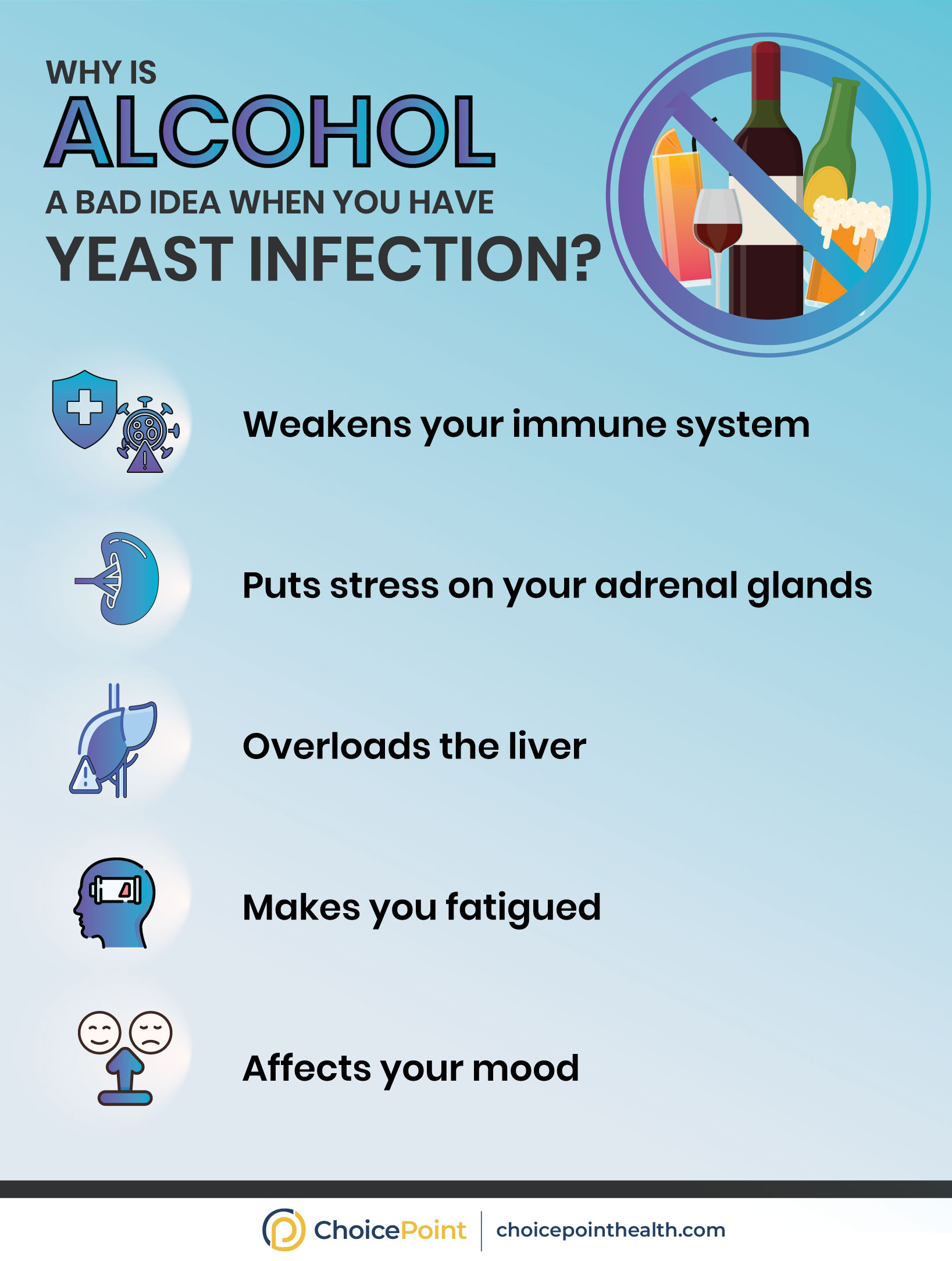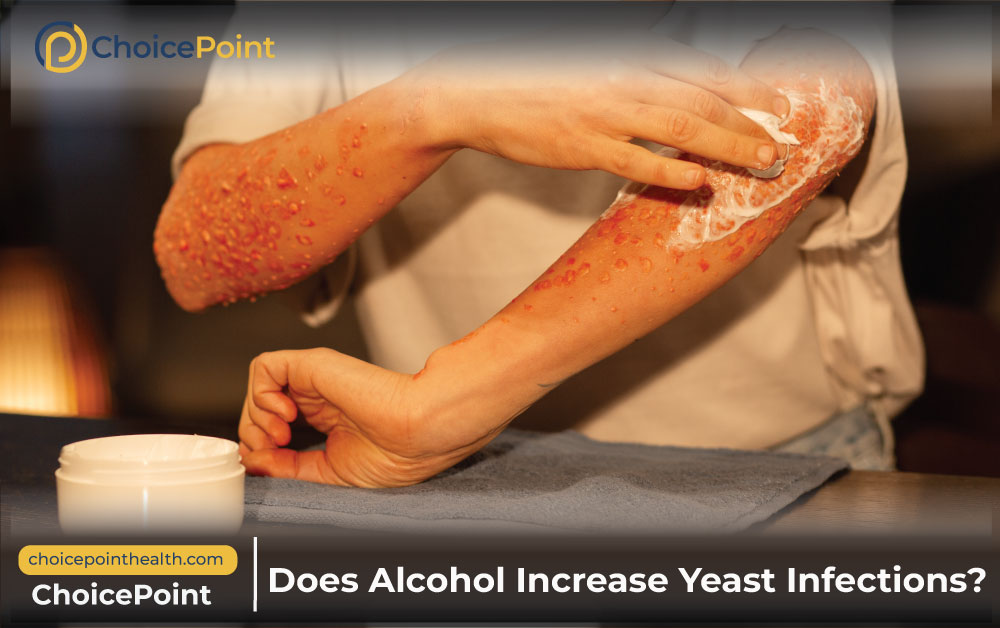‘Does alcohol increase yeast infections?’ YES, it does. Alcohol makes your immune system weak, damages your liver, and affects your adrenal gland, which reduces your ability to keep the infections off. As a result, your body becomes a soft target for yeast to cause infections. Learn how alcohol affects your body’s ability to fight off infection and what you can do about it.
Do you or your loved one need help managing alcohol addiction? ChoicePoint is here to help you. Call us today to receive support recovering from addiction 844.445.2565.
Table of Contents
What Causes Yeast Infections and How Can Alcohol Drinking Make It Worse?
Yeast infections result from the excessive growth of fungi Candida albicans. Candida is naturally present in your gut, intestine, and vagina, but there is a moderate amount. Anything that disrupts Candida’s environment increases the Candida population and leads to a yeast infection. Alcohol abuse can alter the natural balance of the yeast. A few other factors that can increase the yeast infection include:
- Heavy alcohol drinking, of course
- Certain antibiotics
- Skin lesions
- A diet rich in sugar
- Weak immune system
- Stress
- Oral contraceptive
“I am pretty prone to yeast infections, so I try to manage them. I started drinking alcohol last year, and since then, every time I drink, I get a yeast infection the next day. It’s quite uncomfortable and annoying..” ChoicePoint Alumna shared her experience with Susan Gentile, an Adult Nurse Practitioner at ChoicePoint.
“I am pretty prone to yeast infections, so I try to manage them. I started drinking alcohol last year, and since then, every time I drink, I get a yeast infection the next day. It’s quite uncomfortable and annoying..” ChoicePoint Alumna shared her experience with Susan Gentile, an Adult Nurse Practitioner at ChoicePoint.
Signs of Drinking Alcohol and Yeast Infections
You can expect to encounter the following signs when drinking alcohol while you have had an infection:
- Mood swings
- Irritability
- Anxiety
- Difficulty in swallowing (in severe cases)
- Depression
- Diarrhea and nausea
- Gums and tongue soreness

Alcohol Worsens a Yeast Infection
How Does Alcohol Increase Yeast Infections?
Alcohol addiction adversely impacts your health, which is why it’s a risk to increase yeast infections. From your immune system, liver, and adrenal glands to sleep patterns, alcohol being a depressant takes a serious toll on your body.
The table below discusses the three ways in which you can understand how does alcohol increase yeast infection.
| Type of organs/systems influenced by alcohol | The role of organs/systems in the body | How does alcohol increase yeast infection? |
|---|---|---|
| Immune System | Produces white blood cells (WBC) to keep pathogens like fungi (yeast in this case) in check. |
|
| Liver | Constantly works to remove harmful substances produced by candida. |
|
| Adrenal gland | Works to keep the sugar level back to normal by producing cortisol. |
|
Strategies For Managing Yeast Infections
Diflucan is the most common prescription drug for yeast infections. It breaks the cell wall of candida fungi, which cause the infection. With no cell wall, fungi fail to stay alive and do not harm your body.
Diflucan To Treat Yeast Infection
Diflucan (fluconazole) is taken orally. It works within 72 hours – yes, it’s that effective. But, it’s important to be aware of fluconazole and alcohol interaction because, like any other medication, diflucan can negatively interact with alcohol. Drinking alcohol while you are on fluconazole will add fuel to the fire and may increase yeast infection. A few other side effects of Diflucan and alcohol interaction can be:
- Allergic reaction
- Nausea and headache
- Trouble breathing
- Itching
- Throat soreness
- Dizziness
If you are also an alcoholic and often encounter yeast infections, then the best solution for you is to manage your alcohol addiction.

Did you know? CDC 2023 report suggests a sharp increase in antifungal infection every year.

Did you know? CDC 2023 report suggests a sharp increase in antifungal infection every year.
Managing Alcohol Abuse
You can begin by contacting a DEA-certified healthcare provider to discuss how alcohol increases yeast infection and makes you anxious. Your healthcare provider will connect you to an addiction center to help you recover from alcohol addiction.
If you have determined that you have an alcohol abuse disorder, it’s time to take prompt action and call for help. You will go through the following steps during treatment in an alcohol rehab:
Step 1: Evaluation
The alcohol addiction treatment in alcohol rehab starts with a quick evaluation from the staff. They will ask questions about your drinking habits and the side effects they might have caused, which will eventually help you heal your liver, adrenal glands, and immune system.
Step 2: Alcohol Detox
This information helps them devise a personalized addiction treatment according to your needs. It will lead to a medical alcohol detox, which involves removing alcohol and all its byproducts from your body under medical supervision.
Step 3: Manage Withdrawal Symptoms
Alcohol detox comes with withdrawal symptoms. The intensity of these symptoms depends on how frequently you consume alcohol. However, alcohol rehab offers the close attention of clinicians to help you navigate these symptoms comfortably. You may also be administered naltrexone to curb the alcohol craving and prevent a relapse.
Step 4: Inpatient/Outpatient Program
Depending upon your lifestyle, you can either choose an inpatient treatment program or an outpatient treatment program. You will receive comprehensive monitoring so that you don’t have to worry about does alcohol increases yeast infections. These programs provide a holistic alcohol addiction treatment, which means you can expect to receive care for yeast infections.
Part of the program involves addiction therapies and counseling to offer you prevention advice, help you recognize the triggers, and build a life without alcohol.
Take A Quick Assessment
Not sure about alcohol addiction? Take out this confidential assessment today to know the intensity of your alcohol consumption so that you can get to the right path for treatment.
Please note this assessment is an initial self-screening, and it is not meant to be a medical assessment or clinical diagnosis of addiction. For proper diagnosis and treatment, schedule an appointment with ChoicePoint.
Reach Out To ChoicePoint For Holistic Alcohol Addiction Treatment
Avoiding alcohol during fluconazole treatment is difficult if you have an alcohol use disorder. However, seeking professional help can make the process easier for you. ChoicePoint provides both online and onsite addiction treatment. If you’re in New Jersey, you can visit us anytime and get yourself enrolled in our holistic addiction treatment.
In A Nutshell: Does Alcohol Increase Yeast Infections?
Among the other miseries that the addiction brings, alcohol does increase yeast infections and also interacts with fluconazole. To effectively treat yeast infections, it’s essential to seek professional support.
ChoicePoint can help you overcome alcohol abuse disorder. Call us today to get your enquires resolved at 844.445.2565.
Frequently Asked Questions About Drinking Alcohol And Yeast Infection
We have been receiving several queries relating to Diflucan and alcohol. We’re answering a few of them here today:
Why Alcohol Is A Bad Idea When You Have A Yeast Infection?
- Weakens your immune system
- Alcohol puts stress on your adrenal glands
- It overloads the liver
- It makes you fatigued
- It affects your mood
Are There Any Risks Of Fluconazole (Diflucan) Abuse?
Fluconazole misuse can happen if you fail to take the drug according to the prescribed time and dose. Fluconazole abuse can result in:
- Hallucinations
- Heightened fear
Can Drugs Cause A Yeast Infection?
Yes, certain antibiotics and birth control medications can disturb the fungi environment in your body, causing an increase in their growth that may result in yeast infection.
Why You Should Avoid Alcohol While Fighting Candida?
Alcohol increases yeast infection and will delay your cure. It weakens your immune system, allows candida to grow huge in number, and causes yeast infection and accompanying symptoms.
References
- Center for Disease Control and Prevention. Fungal Disease
https://www.cdc.gov/fungal/diseases/ - National Center for Biotechnology Information. 2015. The Role of Innate Immunity in Alcoholic Liver Disease
https://www.ncbi.nlm.nih.gov/pmc/articles/PMC4590620/ - John Hopkins Medicine. Adrenal Glands
https://www.hopkinsmedicine.org/health/conditions-and-diseases/adrenal-glands - National Center for Biotechnology Information. 2016. Alcohol Effects on Stress Pathways
https://www.ncbi.nlm.nih.gov/pmc/articles/PMC4813419/ - National Health Service. Common questions about fluconazole
https://www.nhs.uk/medicines/fluconazole/common-questions-about-fluconazole/ - Food and Drug Administration. Diflucan®
https://www.accessdata.fda.gov/drugsatfda_docs/label/2011/019949s051lbl.pdf - Center for Disease Control and Prevention. 2023.Candidiasis
https://www.ncbi.nlm.nih.gov/books/NBK560624/
Medical Disclaimer:
ChoicePoint aims to improve the quality of life for people struggling with substance use disorder and mental health issues. Our team of licensed medical professionals research, edit and review the content before publishing. However, this information is not intended to be a substitute for professional medical advice, diagnosis, or treatment. For medical advice please consult your physicians or ChoicePoint's qualified staff.










